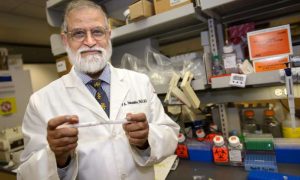The University of Connecticut Health Center (UConn Health) is recruiting ovarian cancer patients for the world’s first clinical trial testing a personalized genomics-driven vaccine (NCT02933073).
The vaccine, called OncoImmunome, targets women with advanced stages of the disease to prevent its relapse. The vaccine boosts a patient’s immune response, killing ovarian cancer cells should they reappear.
The U.S. Food and Drug Administration approved UConn Health’s human clinical trial after researchers — using animal models of ovarian cancer — showed the vaccine effectively reduced tumor growth.

The study, to take place at UConn Health in Farmington will include 15 women with stage III or IV ovarian cancer at initial diagnosis or who suffered a first relapse. The enrolled patients will be monitored for two years, a period when the cancer is most likely to come back.
In the trial, patients will undergo traditional surgery, during which doctors will collect and analyze a sample of the tumor to produce a personalized vaccine. Patients will first receive standard chemotherapy. Those who are cancer-free after traditional treatment will then receive their personalized vaccine — one injection per month — for six months. Every month, researchers will sample patients’ blood to analyze the immune system’s response.
“We are pleased that this moment has come. This clinical trial will test the power of a patient’s own immune system to prevent recurrence of this often fatal disease. We hope this vaccine can fill the huge gap in therapy options for ovarian cancer patients and potentially bring a long-term solution and cure for women battling the disease,” Dr. Pramod K. Srivastavasaid, the vaccine’s inventor, said in a press release.
“Since this trial is a first of its kind, there are a lot of unknowns. We are hopeful the study will answer some of them,” added Srivastava, director of UConn Health’s Carole and Ray Neag Comprehensive Cancer Center.
The vaccine is personalized for each patient after researchers analyze the patient healthy and tumor cells. The analysis includes sequencing the whole genome from both cell types and comparing it to find the specific mutations only present in the cancer cells. This constitutes the genetic ID which identifies the cancer of a specific patient. Based on this genetic ID, specialists at UConn’s School of Computer Sciences and Engineering design the personalized vaccine.

